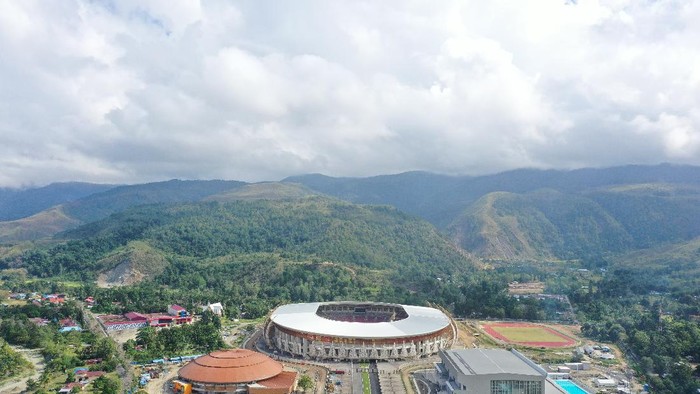Papua Special Autonomy for Equitable Development
By: Rebecca Marian) *
The government is alleged to be extending Special Autonomy for Papua. The people of Papua are looking forward to continuing this special autonomy because it is able to realize equitable development.
2001 was a milestone for the Papua and West Papua regions where the 2 Provinces had obtained the status of the Papua Special Autonomy (Autonomy) Region. With the issuance of Law No. 21/2001 and West Papua through Law No. 35/2008.
Apart from aiming at accelerating and catching up with development from other regions, the spirit of determining the status of Otsus is the granting of the widest possible authority to local governments to formulate, compile and design development strategies needed by local communities.
The seriousness of the government in developing Papua and West Papua is evident from the issuance of Presidential Instruction No. 5/20017 on the acceleration of Welfare Development in Papua and West Papua Provinces. The President of the Republic of Indonesia, Joko Widodo, has continued to accelerate development through the issuance of Presidential Instruction No. 9/2017 on the acceleration of Welfare development in Papua and West Papua Provinces.
For almost two decades Papua’s status as Otsus has been implemented. Observer of Papua and International Politics, Imron Cotan, thinks there is a need for a gradual evaluation of the implementation of Otsus in Papua.
According to him, there must be a fundamental change in the evaluation of the implementation of the Papua Special Autonomy program. Namely, conducting a review or evaluation in stages.
Imron also said that, according to his calculations, since the special autonomy program began until it will end in 2021, approximately Rp. 100 trillion has been disbursed in Papua’s special autonomy funds.
These funds are provided by the central government to provinces in Tanah Papua to develop four strategic sectors, namely education, health, infrastructure and the people’s economy from the general allocation fund of 2 percent.
On a different occasion, the Papua Police Chief Inspector General Pol Paulus Waterpauw assessed that there have been many advances felt by indigenous Papuans since the eastern tip of Indonesia returned to the ranks of the Republic of Indonesia in the 1960s, especially after the implementation of the special autonomy policy since 2001.
On the development side, almost all districts / cities in Papua and West Papua are now relying on funds from special autonomy funds to be able to develop their regions because the potential for genuine blood income (PAD) has not been fully exploited.
Based on these facts, he stressed that there was no reason not to continue the special autonomy policy in the Papua and West Papua Provinces.
The Coordinating Minister for Political, Legal and Security Affairs (Menko Polhukam) Mahfud MD emphasized that the Papua Special Autonomy Law (Otsus) remains in effect. This was conveyed by Mahfud MD after holding a closed meeting with the Minister of Home Affairs (Mendagri) Tito Karnavian, Chairman of the MPR Bambang Soesatyo, Deputy Chairman of the MPR Lestari Moerdijat and a number of DPR members.
At present, the Papua Special Autonomy is nearing the end of its implementation in 2021, so it is necessary to get input on its implementation so far and how it is sustainable.
One of the candidates for the Regional Secretary (Sekda) of Papua, Dance Yulian Flassy, SE., M.Si, said that the standard of living of the Papuan people, as well as providing opportunities for indigenous Papuans, should be based on basic values which include protection and respect for ethics. and morals, the basic rights of indigenous people, human rights, the rule of law, democracy, pluralism, and equality, rights and obligations as Indonesian citizens.
On the other hand, on the way to the end of the implementation of Otsus Papua, various groups in the Papua region consider that Otsus Papua has not had a significant impact on the welfare of the Papuan people.
The former Regional Secretary of Tolikara said there was an opinion that the special policies of the government had not been proven to improve the conditions of the socio-economic welfare of the Papuan people.
However, actually the stamp of “failure” in the implementation of the Papua Special Autonomy is not entirely the fault of the central government, because the provincial and district / city governments in the Papua and West Papua regions have also contributed to the failure to implement the Papua Special Autonomy.
He then suggested, there needs to be a continuation of the implementation policy of Special Autonomy for Papua Volume II. This is based on the views of regional leaders, academics, leaders of indigenous groups, religions including the indigenous Papuans themselves regarding Special Autonomy for Papua Volume I which they feel is lacking in implementation.
This means that the Grand Design of Papua Special Autonomy needs to be rearranged so that there are the same guidelines in implementing Otsus. The Grand Design should be well socialized in order to end the interpretation and propaganda of the Special Autonomy that has drowned the important agenda in this policy.
) * The author is a Papuan student living in Jakarta
